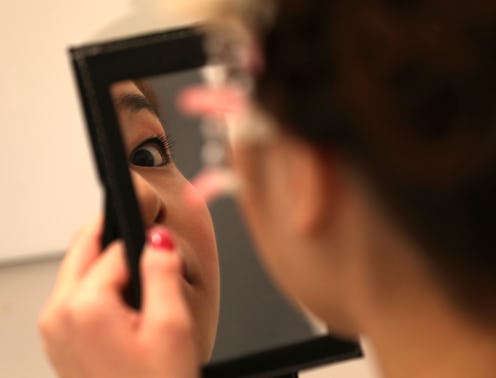News
A College Told Girls to Do What to Prevent Rape?!
Sure, here's some sound advice for college freshman: watch your faces, girls, or you could... invite rape? According Mic, New Jersey's Ramapo College is telling girls to practice their anti-rape faces, because being aware of their facial expressions might "lessen the chances of assault." Excuse me while I slam my unpracticed-face with my palm.
The advice came as part of an annual presentation to do with alcohol, aimed at new and returning peer facilitators working with freshman students. One of the people who spoke was Cory Rosenkranz, the school's Substance Abuse & Violence Prevention coordinator, and boy, did she have some great advice about what female students could do to avoid "inviting" sexual assault. Like, you know, being aware of how they dress, how much they drink, or how people could interpret their body language and facial expressions .
Brandon Molina, a returning peer facilitator, told Laura French and Yovanna Garcia of the Ramapo News that Rosenkranz even suggested "practicing" their facial expressions in a mirror:
[Cory] started the presentation by talking about preventative measures…but then it became kind of peculiar, the extent she was taking it to. She was saying that women need to watch their body language and that women should practice how they articulate their face by practicing in the mirror.
To be perfectly honest, I'm not exactly clear on what is actually being said here — just what kind of facial expressions deter or invite sexual assault? Is it looking too sexy, too friendly, too scared? What expression is the right expression (and does my face even have the right expression)?
No, really, it's important that these questions be answered. Because with 80 percent of sexual assault victims being under the age of 30, with one in four women experiencing sexual assault during their college years, and horror story after horror story after horror story emerging from campuses across the U.S., well, I need to know how my face could be keeping me safe (or not, as the case may be). I need to know which expression is saying, Sure, illegally violate my body against my will!
What's truly terrifying is, this absurd attitude wasn't just being discussed, it was being taught. The victim-blaming was literally part of a presentation. Peer-facilitators —and by extension, all the 18-year-old female students they were going to be working with — were being told that there was something they could be doing (with their bodies, their faces, their clothes) that could stop them from being assaulted. The implication being: don't do these things, and you're making your choice. An attitude which, in spite of big steps forward, is still way too much a part of college culture.
According to a recent Massachusetts Institute of Technology sexual assault survey, 44 percent of victims of sexual assault, who didn't report the crime, said they were reluctant to do so because they felt they were “at least partially at fault” or the perpetrator wasn’t “totally at fault.” Why? According to the survey, 31 percent of female students think sexual assault happens when “men get carried away in sexual situations once they’ve started." In other words, if a girl invites it — whether intentionally, or, you know, with her unpracticed facial expression — then it's kinda unfair of her to stop it.
As Molina put it:
My thought the whole time was maybe women shouldn’t practice how long they’re blinking, men should just not rape people.
Images: Getty Images (3)
